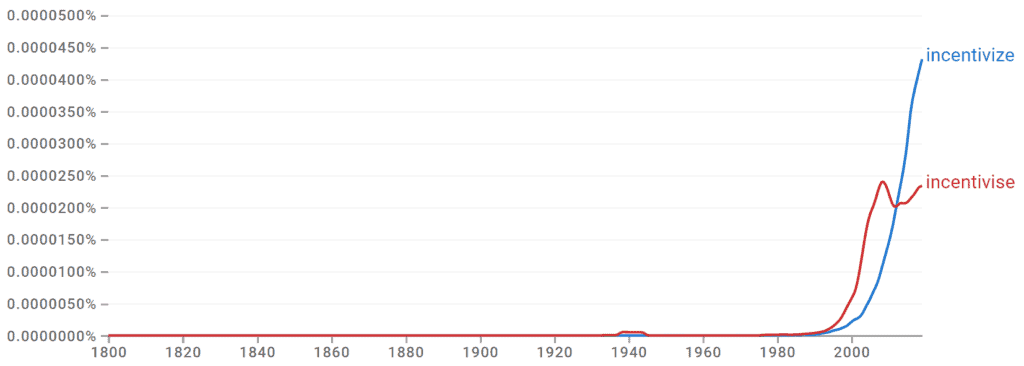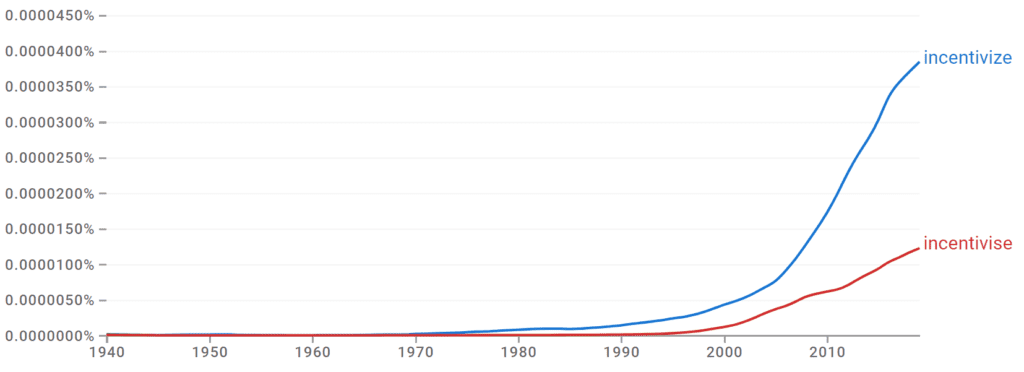There seems to be quite a bit of confusion surrounding words that seem the same but have differing suffix endings. Incentivize and incentivise are great examples of this, even though the words are the same and the spelling differences are easy to explain.
We aren’t just going to explore why there are two different spellings but also explain how to use this word in the first place, where it came from, and why incent also means the same!
Read on below to help better understand these odd English nuances.
What’s the Difference Between Incentivize and Incentivise?
To incentivize (or incentivise outside North America) is to motivate using the expectation of a reward. It comes from the word incentive.
Incentive is rooted in the 15th-century Late Latin term incentivus, meaning “inciting.” It was used to describe “provocative, exciting, or encouraging” action.
The modern use of incentivize first was used in the 1940s with the British spelling, incentivise leading to the American spelling, incentivize. Incentivize, or incentivise, referenced a system of rewards to encourage more focused work and was jargon in the U.S. War economy before it became more mainstream in public use.
How Does the Suffix -ize Change a Word?
The addition of -ize or -ise to the end of a word means “to render or make” and denotes the doing of something to the noun or adjective it is attached to.
The suffix addition is meant to encourage or incite motivation in this scenario.
The replacement of the -s with a -z to form incentivize is common with British to American spellings, as the North American versions tend to be more phonetic in their use. On that note, the -ise suffix use is becoming rare in Britain as modern spellings take precedence.
History of Modern Use
With its inception in the 1940s during the World War II war effort, it was likely you would never have heard of incentivize outside of military use. But, the term has caught on more broadly in this century.
Many English language purists object to it, not just because it’s new but also because it tends to replace older synonyms such as motivate, stimulate, and inspire.
But despite the objections, the word doesn’t seem to be going away. It is, in fact, becoming more common, and it has even begun to find its way into well-written, carefully edited texts. This suggests that many writers feel it is useful and that it is not an exact synonym of motivate, etc.
What Does Incent Mean?
The definition of incent is a way to inspire or motivate somebody using the expectation of a payoff or reward (which means the same as incentivize and incentivise).
Origins of Incent
The origin of this word is hard to track down but has the virtue of being somewhat old. The first example cited in the Oxford English Dictionary is from 1844, though the word seems to have fallen out of use through the middle decades of the 20th century.
Incent is a back-formation of incentive and not the root word of incentivize.
Here are two examples of its use in the early 20th century:
- [I]t is to be hoped there is a place for it and that it may have some influence in uplifting the women, arousing their ambition, and incenting them to learn to read. [Bible Society Record (1906)]
- The side did better than was expected because it was incented to do its best, and that more so because it had to take the field without its veteran leader. [The Fortnightly Review (1912)]
Incent actually came into modern use a few decades after incentivize became used, originating from a U.S. Government-speak revival of the word between the 1970s and 1990s.
Today, it is used in both North America and the U.K. as a shortened version of incentivize, slang if you prefer. However, it, too, has its haters since it sounds so much like “incense” and is generally flagged as grammatically incorrect by most computer programs.
In early use, the word appears to have been most common in the U.S., though early examples show that it was by no means confined to the U.S., suggesting the word may have been less an Americanism than a well-traveled bit of global military-speak. And today, for mysterious reasons, the word is more common in the U.K. than in the U.S.
Using Incentivize in Sentences
- The entrepreneur felt it best to incentivize individual employee risk, innovation, and success instead of providing rewards to the entire office.
- Various energy sectors incentivize the use of materials that help minimize heating and cooling loss.
- Incentivized contracts involving fixed prices on materials allow businesses to review what they consider fair bids on the jobs they offer.
- The possibility of incentivizing the staff using bonuses in stocks was talked about in the last managerial meeting.
Let’s Review
Incent, incentivize, and incentivise all mean the same thing. They are used to extend the idea of motivation using the expectation of a reward. Incentivize and incentivise are the same word, with the British favoring the -ise ending.
Incent is actually an older word altogether and is a back-formation of incentive. It generally is used in the modern day as a shortened form of incentivize or slang form.



